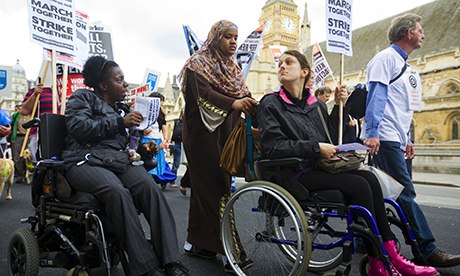The new minister for disabled people fails to understand that welfare cuts are really hurting. He must be on our side rather than against us

A protest in London by disabled people
against cuts in their benefits. Photograph: Martin Argles for the
Guardian
The Department for Work
and Pensions is a farce. The sort you would call on if you wanted a policy to
end up: being ruled "legally
flawed", such as the "back to work" scheme, which was successfully
challenged by a graduate who was made to work unpaid in Poundland; being massively
delayed, as in the postponement of personal independence payments (PIPs); or
declared "not
fit for purpose", as in the universal credit IT programme.
As the department welcomed
a new minister for disabled people last month, it struck me that the DWP isn't
even sure how basic representation works. Mike Penning, the Tory's new disability minister has
spent his first month on the job largely misrepresenting every major problem
facing us. He has promoted the myth
that most people on disability living allowance (DLA) do so without any medical
assessment. He has said spending on the DLA's replacement, PIPs, will be cut
next year. He has declared, in light of the toxic failure
of the work capability assessment, that scrapping it would be "a
disaster".
Under this government, the
role of "minister for disabled people" only applies if disabled people want benefits decided by a
computer test administered by a company that appears to fail
to understand what brain damage is, and which finds people fit for work weeks
before they die. "Minister for disabled people" if disabled people like
doing unpaid work or being forced on to failing
job schemes that ignore them because they are too hard to help, and having
their benefits sanctioned when they are too ill to get up. "Minister for
disabled people" who want to be pushed further into poverty.
The PIP chaos that emerged
last month is symbolic of the incompetence that defines the coalition
government's handling of disability and sickness issues. At the same time as
admitting it needs to delay the introduction of the benefit, it sticks with
restricting mobility payments to those who can walk less
than 20 metres, contrary to the advice of experts and disabled people
themselves. Power knows better.
Labour, meanwhile, has
just released the results of its Making
Rights a Reality for Disabled People consultation, the product of actually
listening to the fears and thoughts of the people affected. We'll wait to see if
Rachel Reeves, the shadow work and pensions secretary, and Kate Green, Penning's
shadow, put the words into action.
Half of disabled people
are using loans to pay for food and clothes, and 100,000 people are without the
basic care that lets them get washed in the morning, according
to the disability charity Scope. In addition, 420,000 people are being charged
bedroom tax and 700,000 seriously ill people are limited to just one
year's benefit.
Guardian